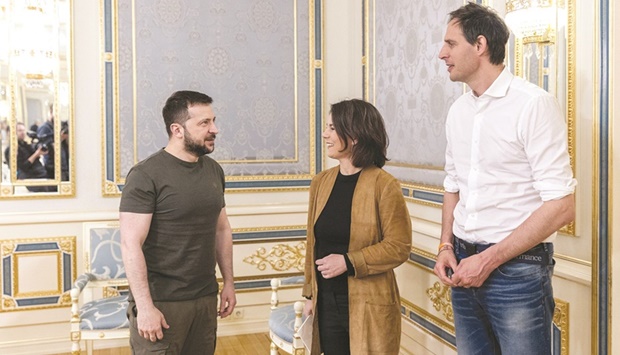Ukraine said yesterday its forces had recaptured villages from Russian troops north and northeast of Kharkiv, pressing a counter-offensive that could signal a shift in the war’s momentum and jeopardise Russia’s main advance.
Tetiana Apatchenko, press officer for the 92nd Separate Mechanised Brigade, the main Ukrainian force in the area, confirmed that Ukrainian troops had in recent days recaptured the settlements of Cherkaski Tyshky, Ruski Tyshki, Borshchova and Slobozhanske, in a pocket north of Kharkiv.
Defence Ministry adviser Yuriy Saks said the successes were pushing Russian forces out of range of Kharkiv, Ukraine’s second-largest city and located in the northeast, which has been under perpetual bombardment since the war began.
“The military operations of the Ukrainian armed forces around Kharkiv, especially north and northeast of Kharkiv, are sort of a success story,” Saks told Reuters. “The Ukrainian army was able to push these war criminals to a line beyond the reach of their artillery.”
In Washington, US Director of National Intelligence Avril Haines said Russian President Vladimir Putin appeared to be preparing for a long conflict. A Russian victory in the Donbas region in the east of the country might not end the war, she said.
The head of the US Defense Intelligence Agency (DIA) said the war was at a stalemate.
But the counterattack near Kharkiv could signal a new phase, with Ukraine now going on the offensive after weeks in which Russia mounted a massive assault without making a breakthrough.
By pushing back Russian forces who had occupied the outskirts of Kharkiv since the start of the invasion, the Ukrainians are moving into striking distance of the rear supply lines sustaining the main Russian attack force further south. “They’re trying to cut in and behind the Russians to cut off the supply lines, because that’s really one of their (the Russians’) main weaknesses,” said Neil Melvin of the RUSI think-tank in London.
“Ukrainians are getting close to the Russian border. So all the gains that the Russians made in the early days in the northeast of Ukraine are increasingly slipping away.” By pushing back near Kharkiv, Ukraine could now force Moscow to switch to trying to defend its own long supply lines to Izyum. Western military analysts said there were signs the counter-attack was already sapping Russia’s advance.
“Our assessment is that they’re (Russians) having to pull some forces away from the axes leading to the control of the Donbas region because of what has happened in Kharkiv, and it just underscores the challenges they have,” said retired US General Jack Keane, now chairman of the Institute for the Study of War think-tank.
In the south, Russian forces were again pummelling the Azovstal steelworks in Mariupol yesterday, trying to capture the last bastion of Ukrainian resistance in the ruined city where Ukraine says tens of thousands of people have died under two months of Russian siege and bombardment.
Germany’s Foreign Minister Annalena Baerbock visited Ukraine yesterday and toured Bucha, the suburb north of Kyiv where Russian forces left behind hundreds of corpses of civilians when they withdrew at the start of April. She said the killers must be punished.
“That is what we owe to the victims,” she said. “And these victims, you can feel that here very intensely, these victims could have been us.”
Baerbock was the first German cabinet minister to visit Ukraine since the start of the war after visits by senior officials from other Western countries. Kyiv has rebuked the Berlin government for being slow to disavow years of economic ties with Russia.
Haines told lawmakers in Washington that the US believed that Putin was counting on Western resolve to weaken over time and there was concern about how the conflict would develop.

Ukrainian President Volodymyr Zelensky (left) welcomes German Foreign Minister Annalena Baerbock (centre) and Dutch Foreign Minister Wopke Hoekstra in Kyiv yesterday. (Reuters)
